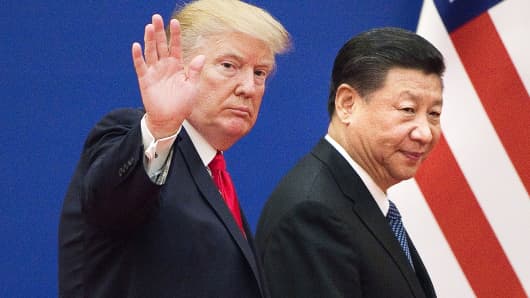- The U.S. trade war has shown that China is not impervious to the measures being brought to bear by President Trump
- Overnight, the Shanghai composite tanked 3.7 percent on the first trading day back after being closed for a weeklong Chinese holiday.

U.S. President Donald Trump and Chinese dictator Xi Jinping
President Donald Trump's approach to levying tariffs on China in hopes of applying enough economic pressure to get Beijing to change its ways on trade has a better chance of working than many people expect, CNBC's Jim Cramer said Monday.
"I think the president is right. I favor tariffs against the Chinese because I think they're far more of a paper tiger than people realize," Cramer said, contending the world's second-largest economy and stock market are more vulnerable than the mainstream media depicts.
The term "paper tiger" refers to an outwardly powerful or dangerous force that's actually inwardly weak or ineffectual.
"The intelligentsia in this country [the U.S.] has decided that China is all-powerful and we're all weak. Empirically, that's not the case, particularly when you look at the Chinese stock market, which does matter," Cramer said on "Squawk on the Street."
The U.S. trade war has shown that China is not impervious to the measures being brought to bear by Trump, Cramer said.
"The intelligentsia in this country [the U.S.] has decided that China is all-powerful and we're all weak. Empirically, that's not the case, particularly when you look at the Chinese stock market, which does matter," Cramer said on "Squawk on the Street."
The U.S. trade war has shown that China is not impervious to the measures being brought to bear by Trump, Cramer said.
"They may be communist, but they have a capitalist bear market going there."
There's a school of thought that the volatile Chinese stock market is not an important indicator of the health of China's economy because households there don't have much of their wealth invested.
"We can think that that doesn't matter but that's cause we're being elitist. And I think that's a big mistake," Cramer said.
Overnight, the Shanghai composite tanked 3.7 percent on the first trading day back after being closed for a weeklong Chinese holiday.
There's a school of thought that the volatile Chinese stock market is not an important indicator of the health of China's economy because households there don't have much of their wealth invested.
"We can think that that doesn't matter but that's cause we're being elitist. And I think that's a big mistake," Cramer said.
Overnight, the Shanghai composite tanked 3.7 percent on the first trading day back after being closed for a weeklong Chinese holiday.
Following weakness last week across Asia, Europe and on Wall Street, that sharp decline was being viewed as a catch-up move.
The Shanghai composite has dropped nearly 18 percent year-to-date.
Against a backdrop of persistent trade concerns and a sign that more stimulus is needed, China's central bank on Sunday cut for the fourth time this year the amount of cash banks need to have on hand.
Against a backdrop of persistent trade concerns and a sign that more stimulus is needed, China's central bank on Sunday cut for the fourth time this year the amount of cash banks need to have on hand.
Aucun commentaire:
Enregistrer un commentaire